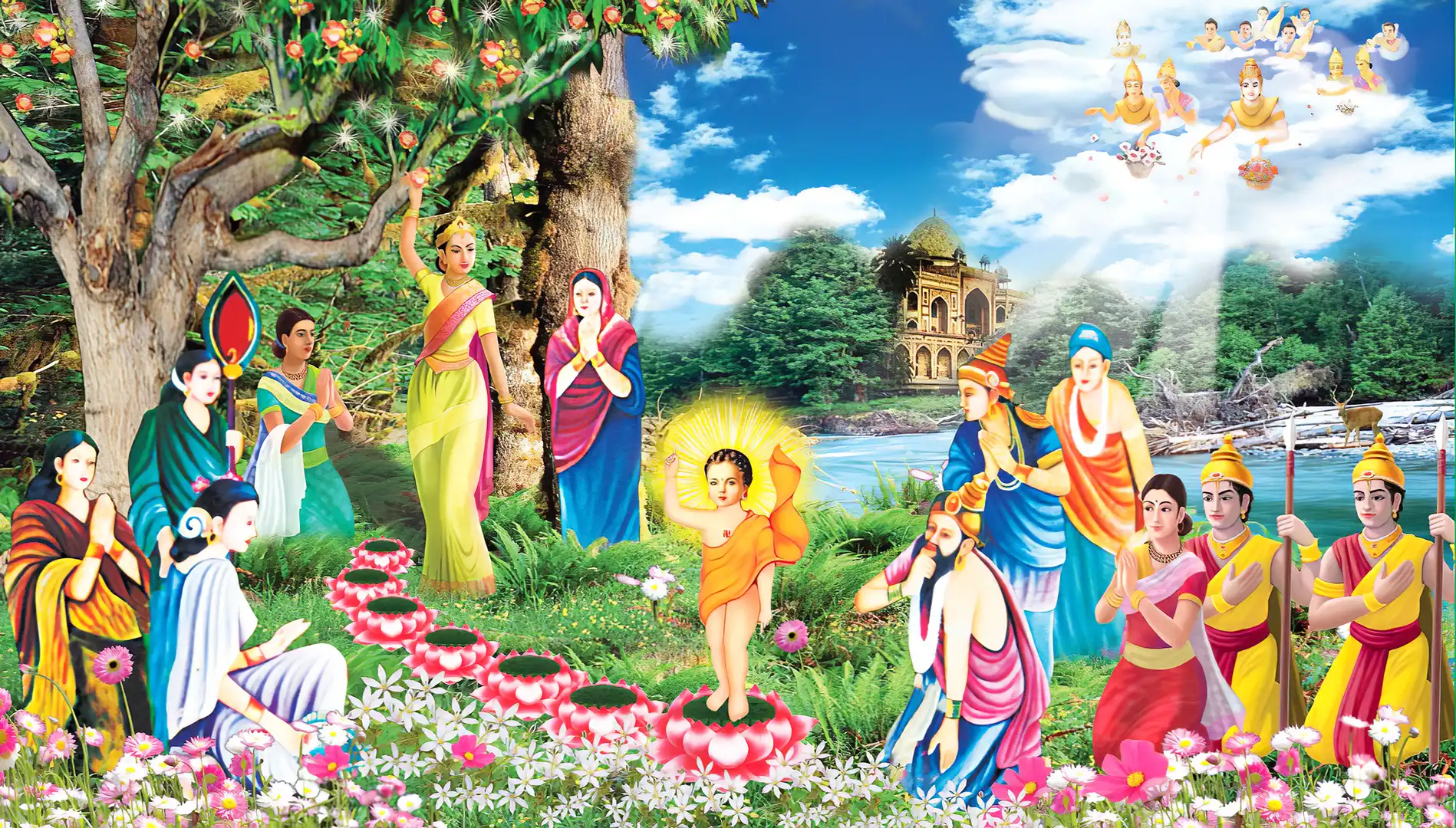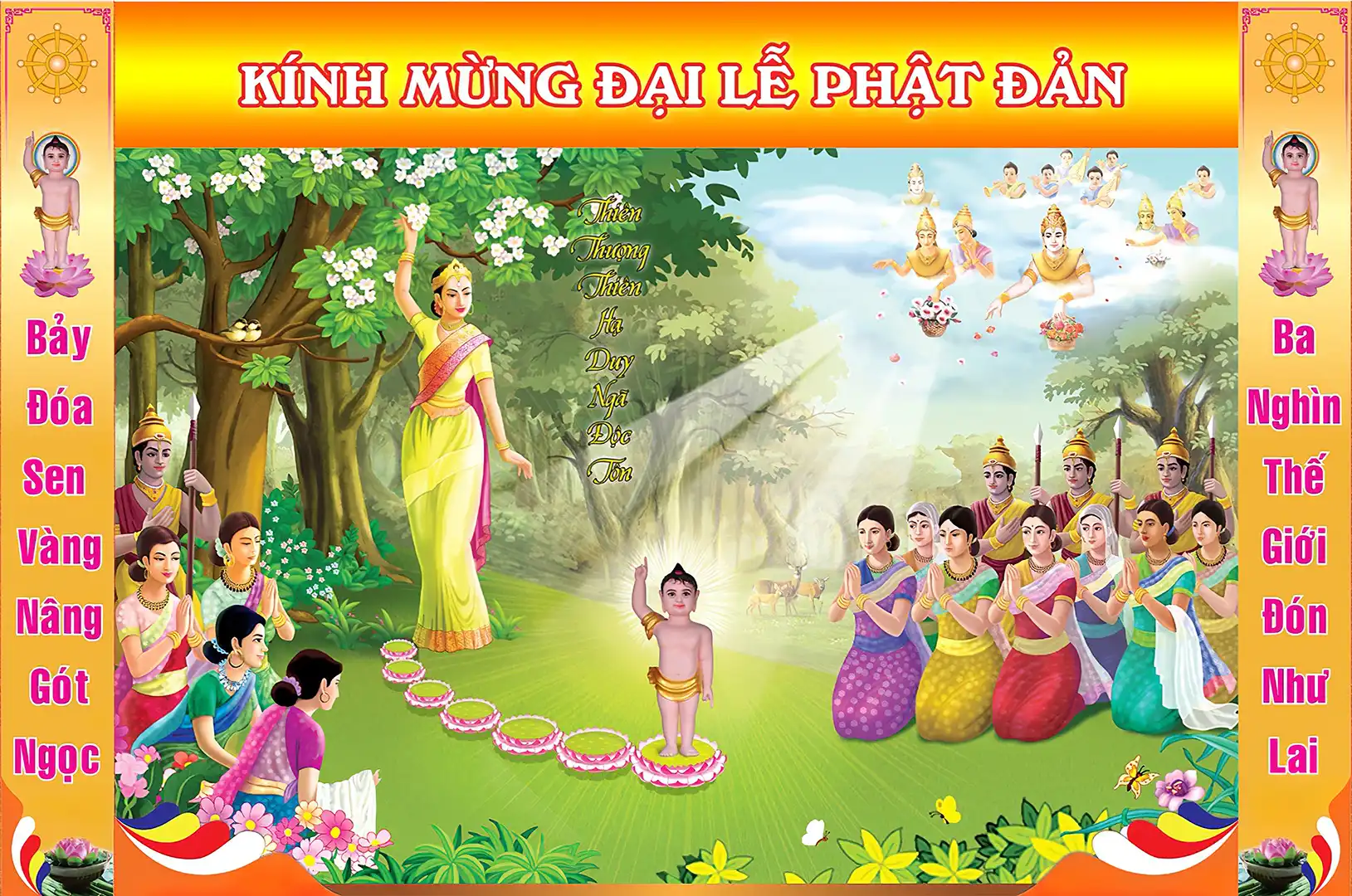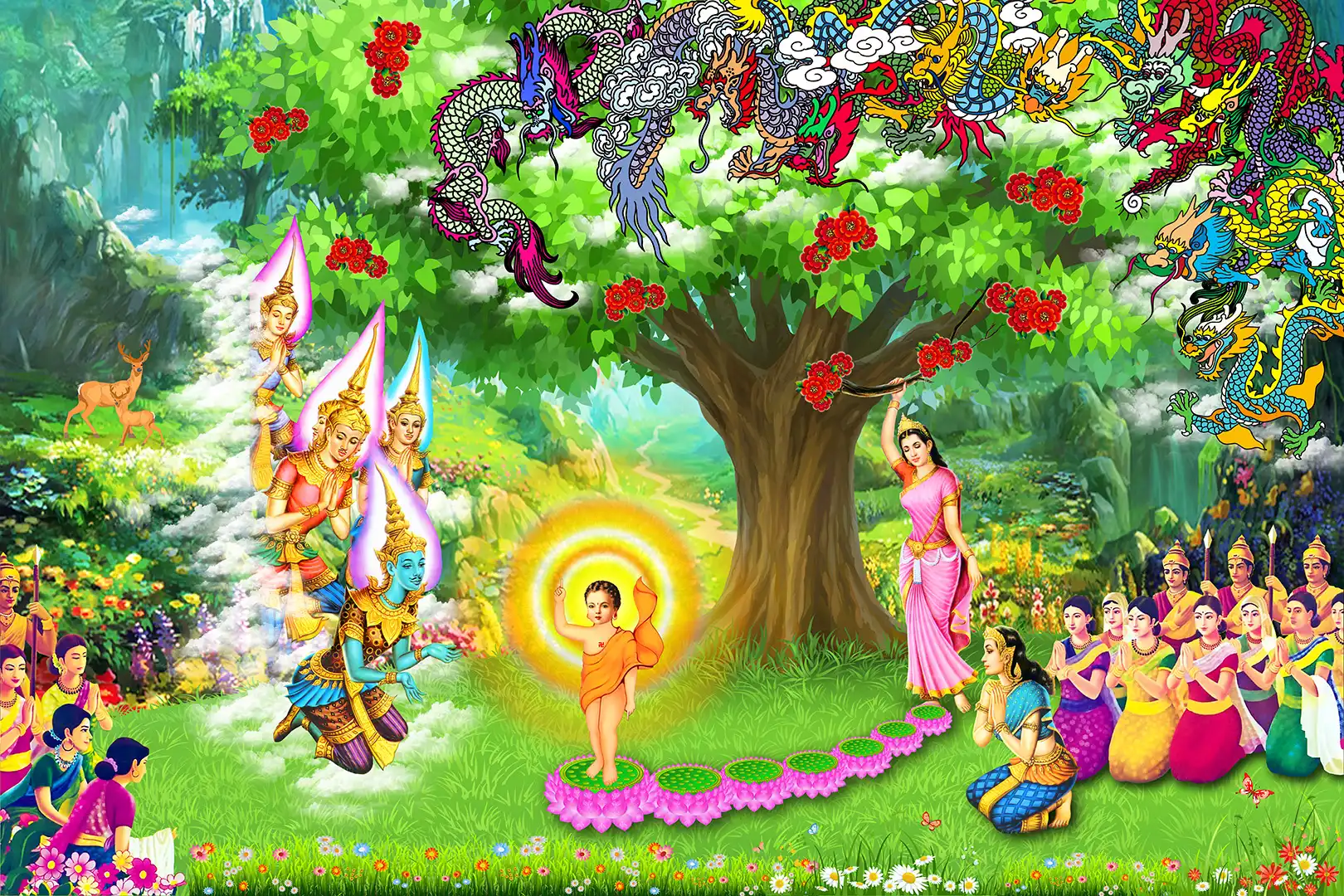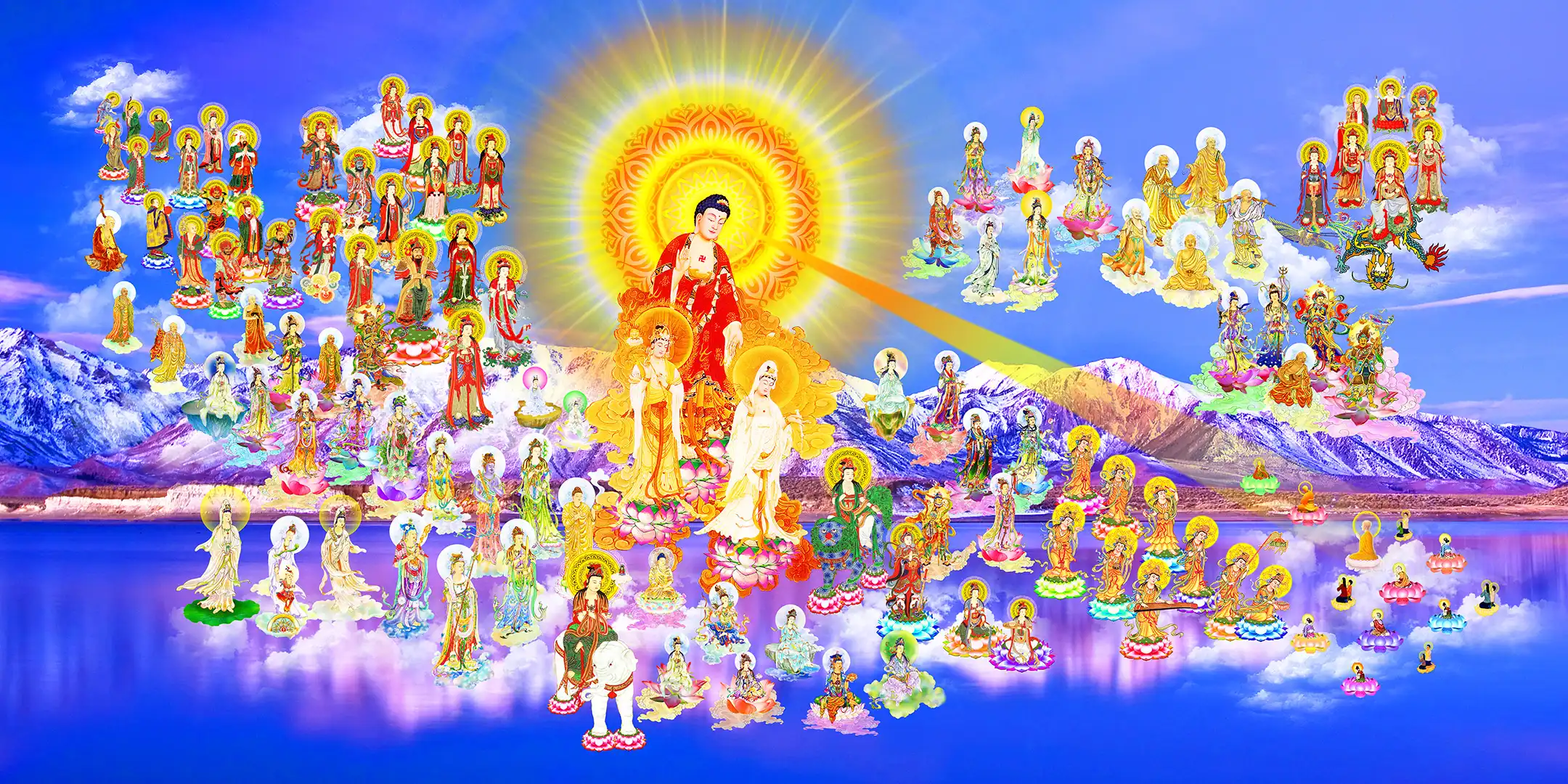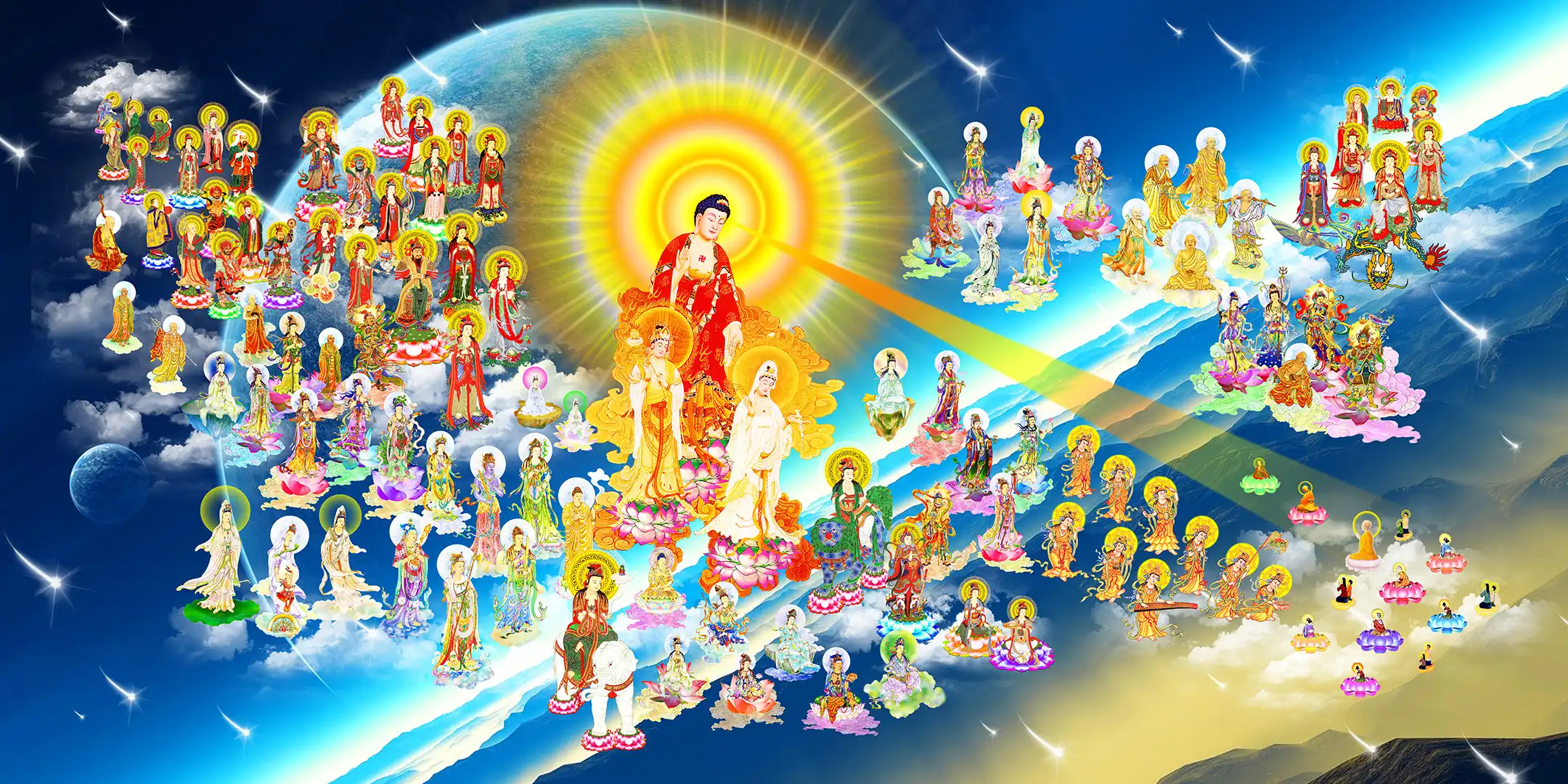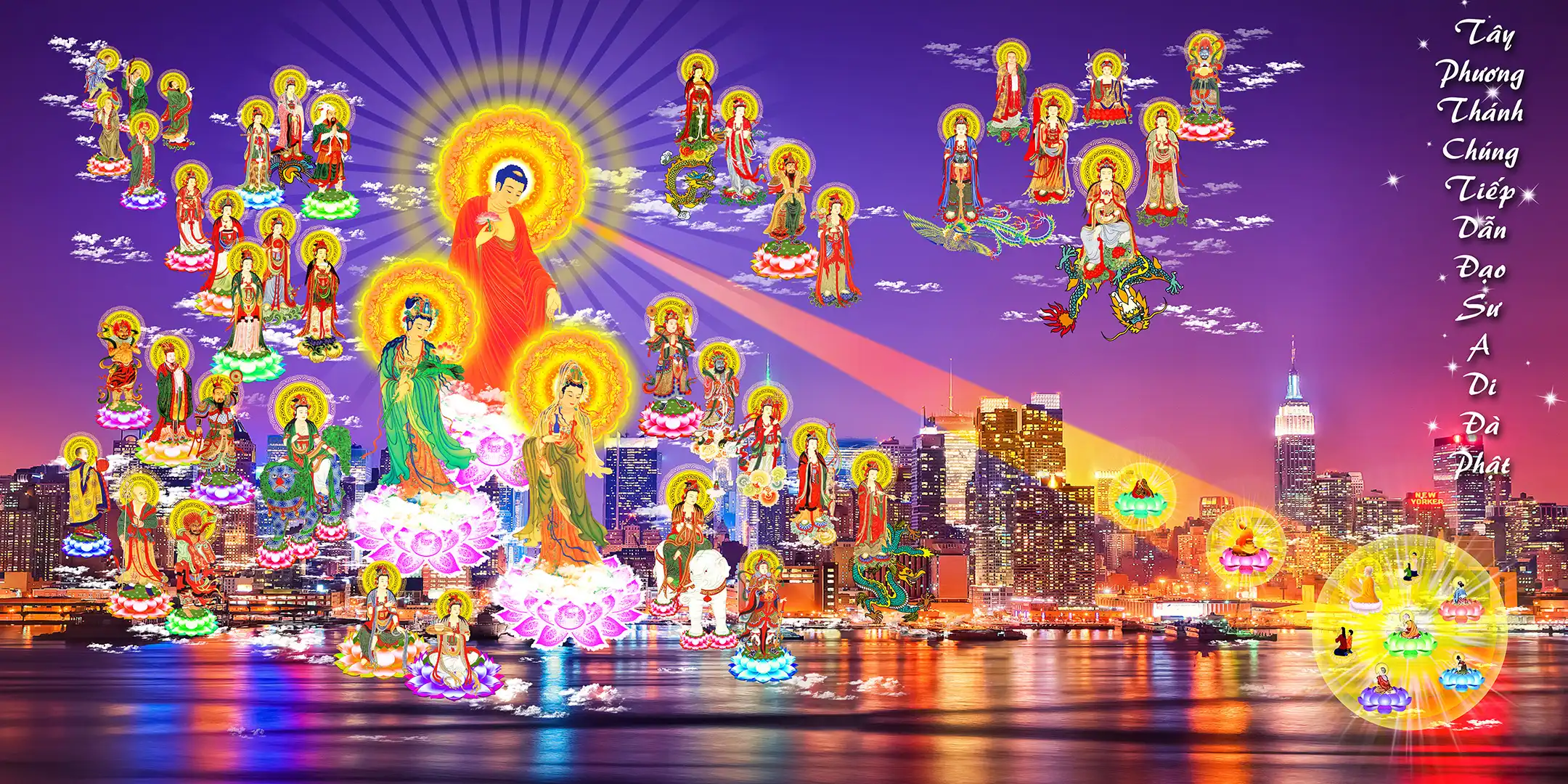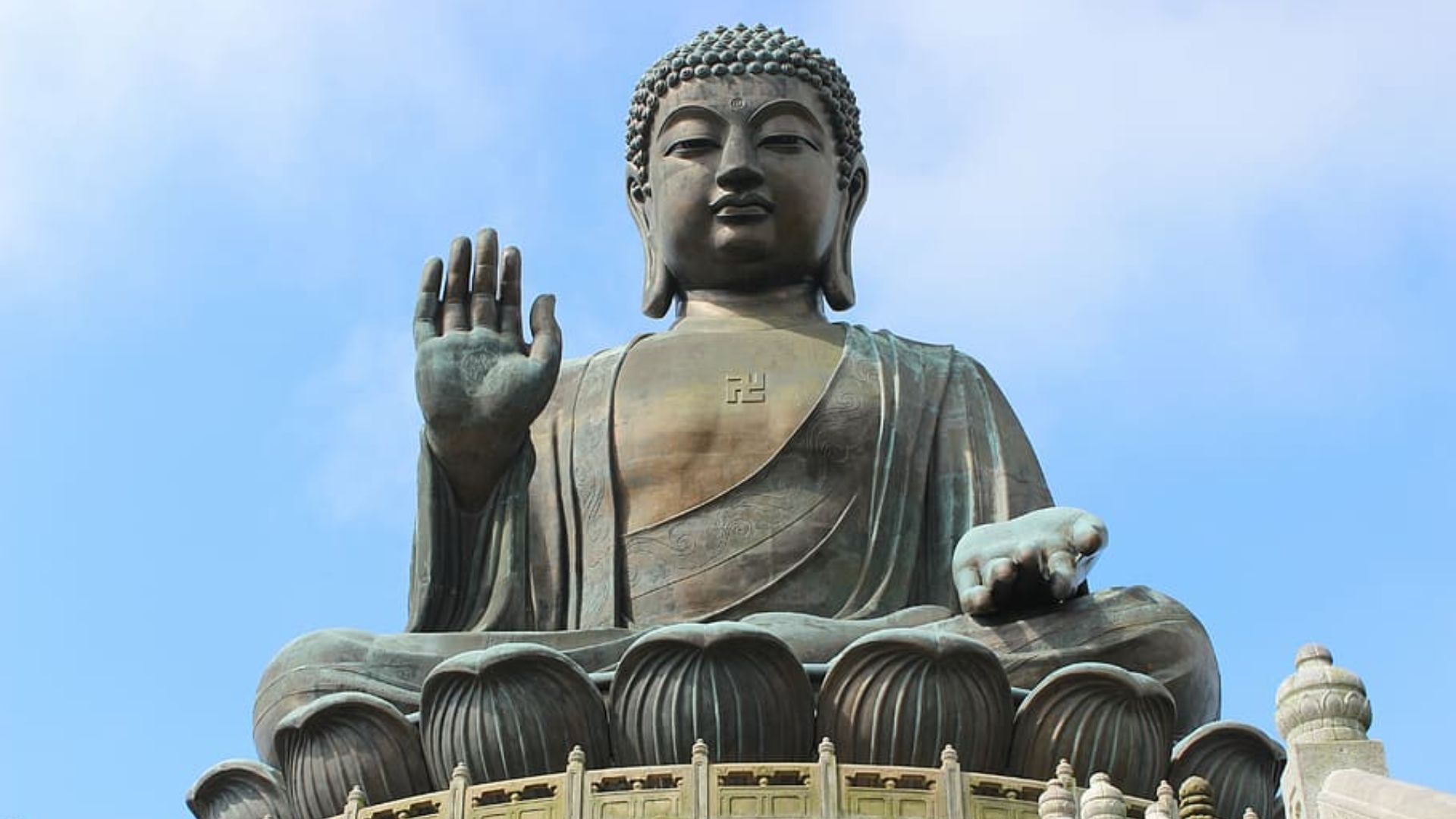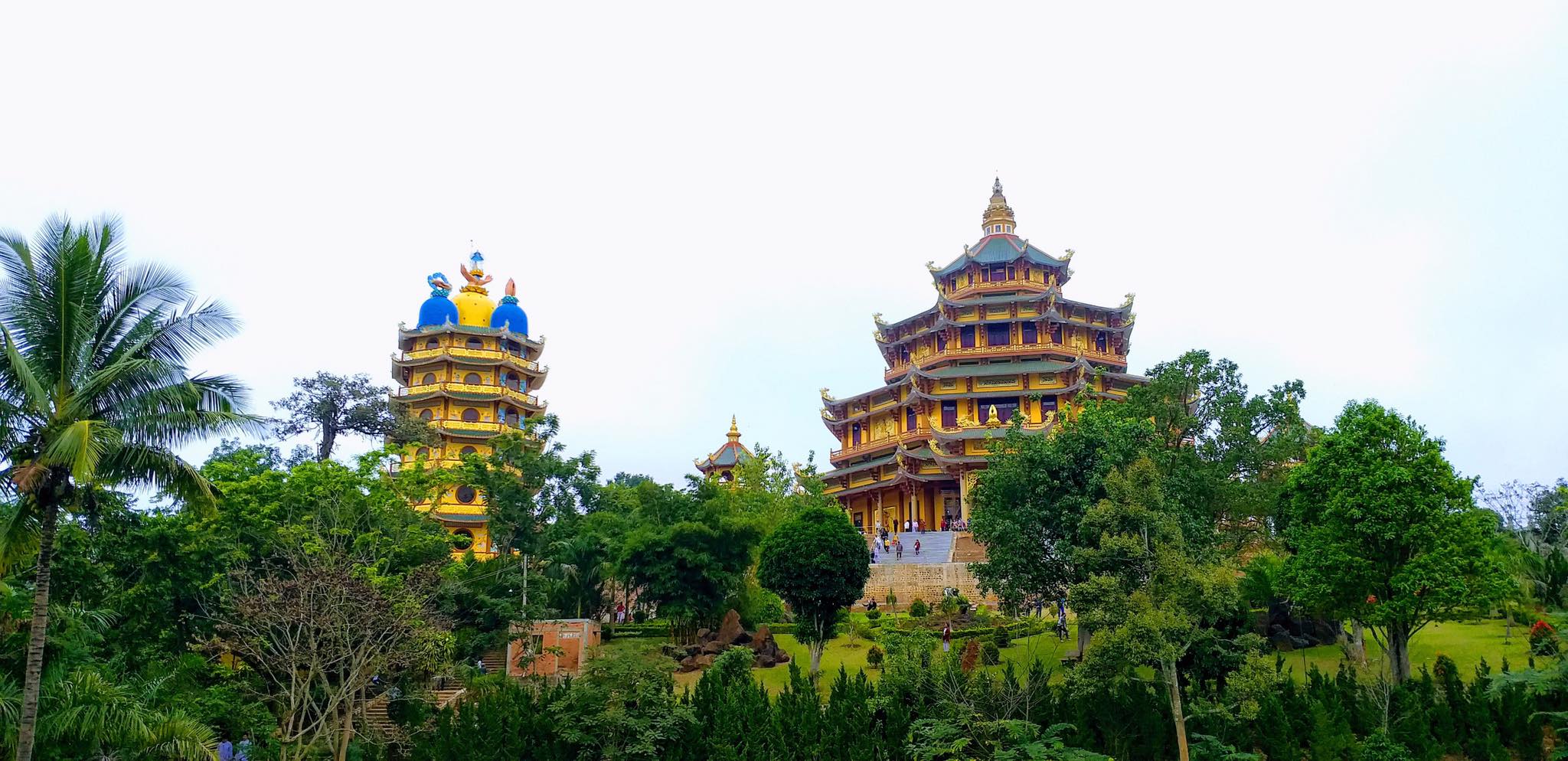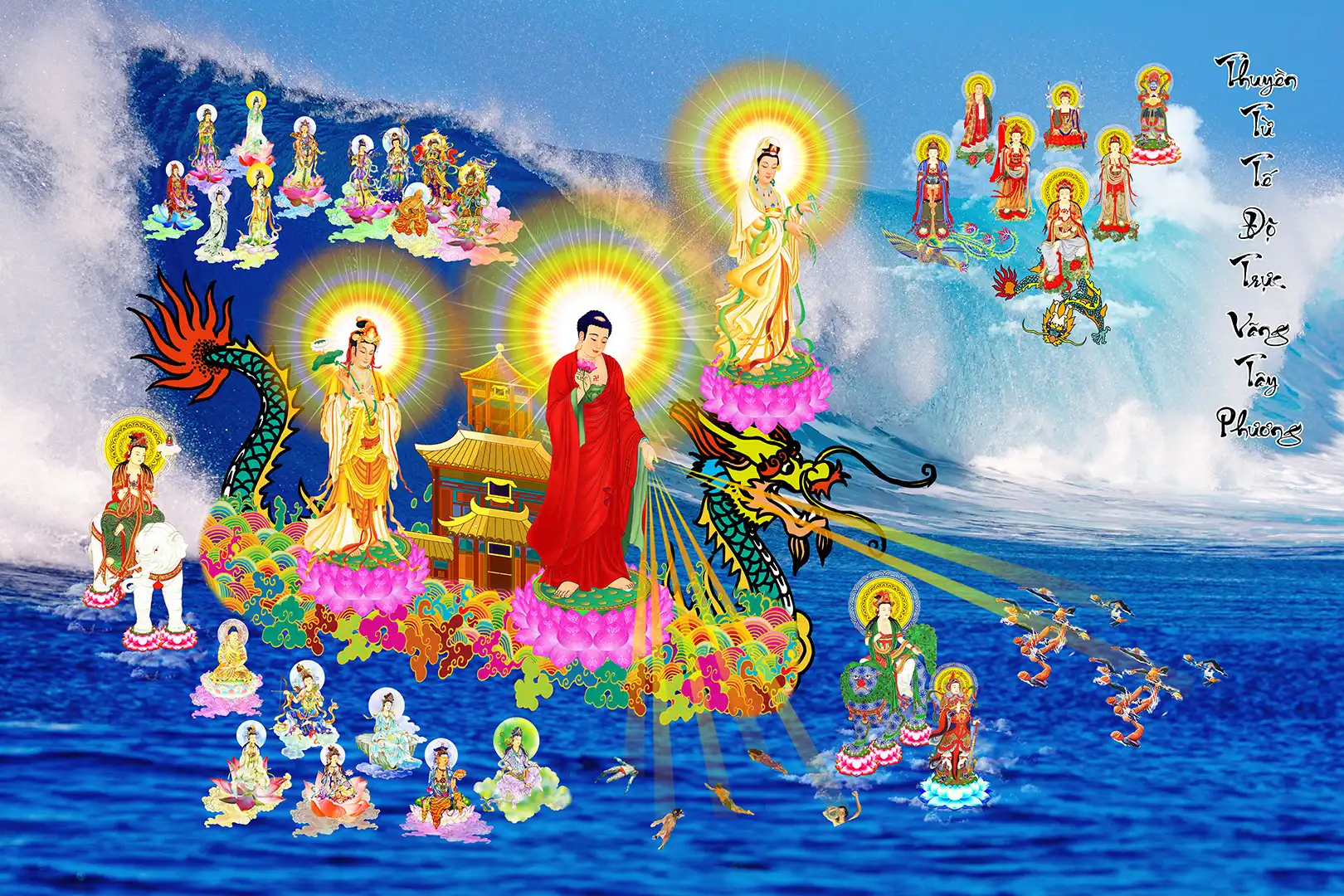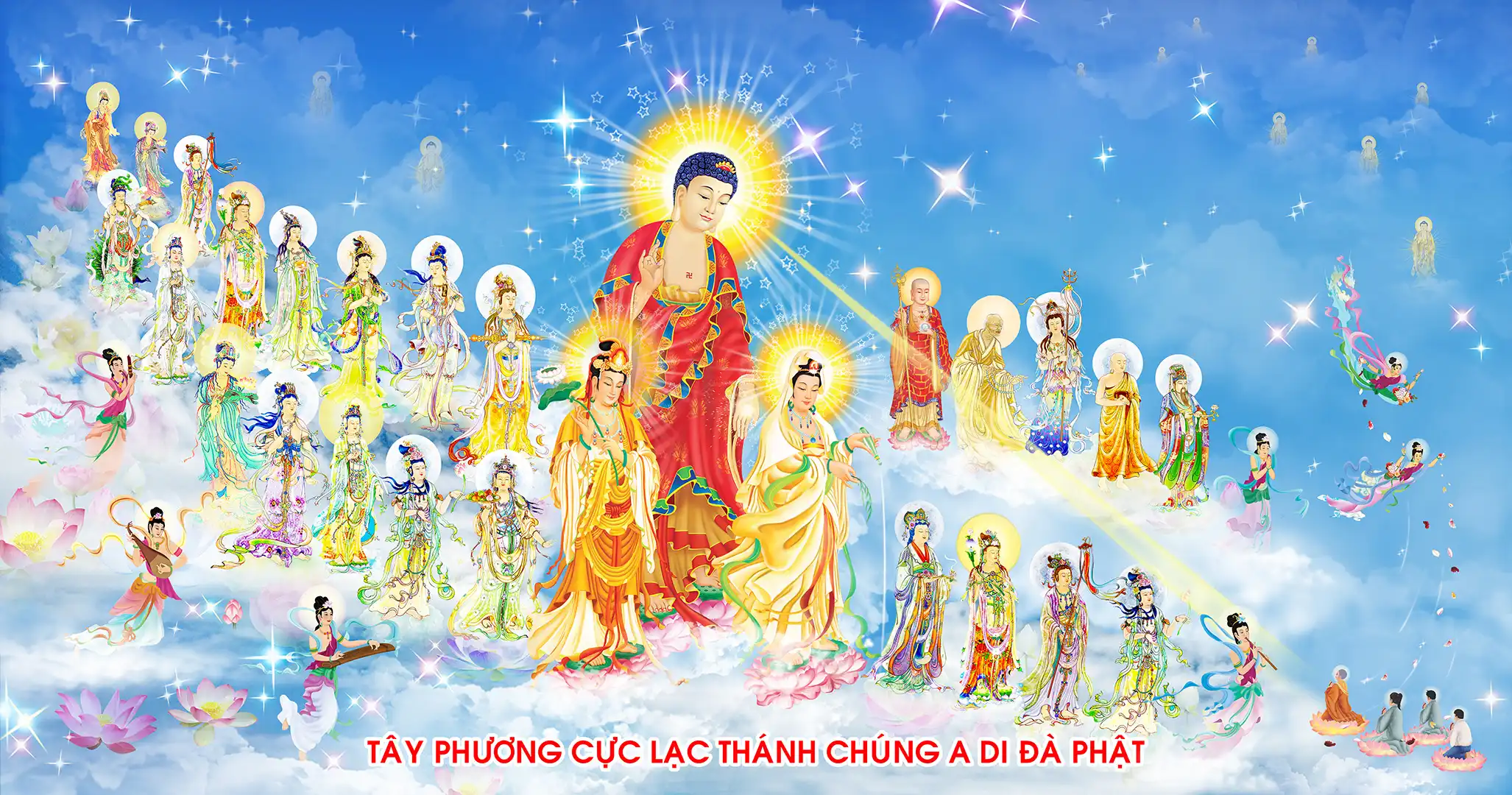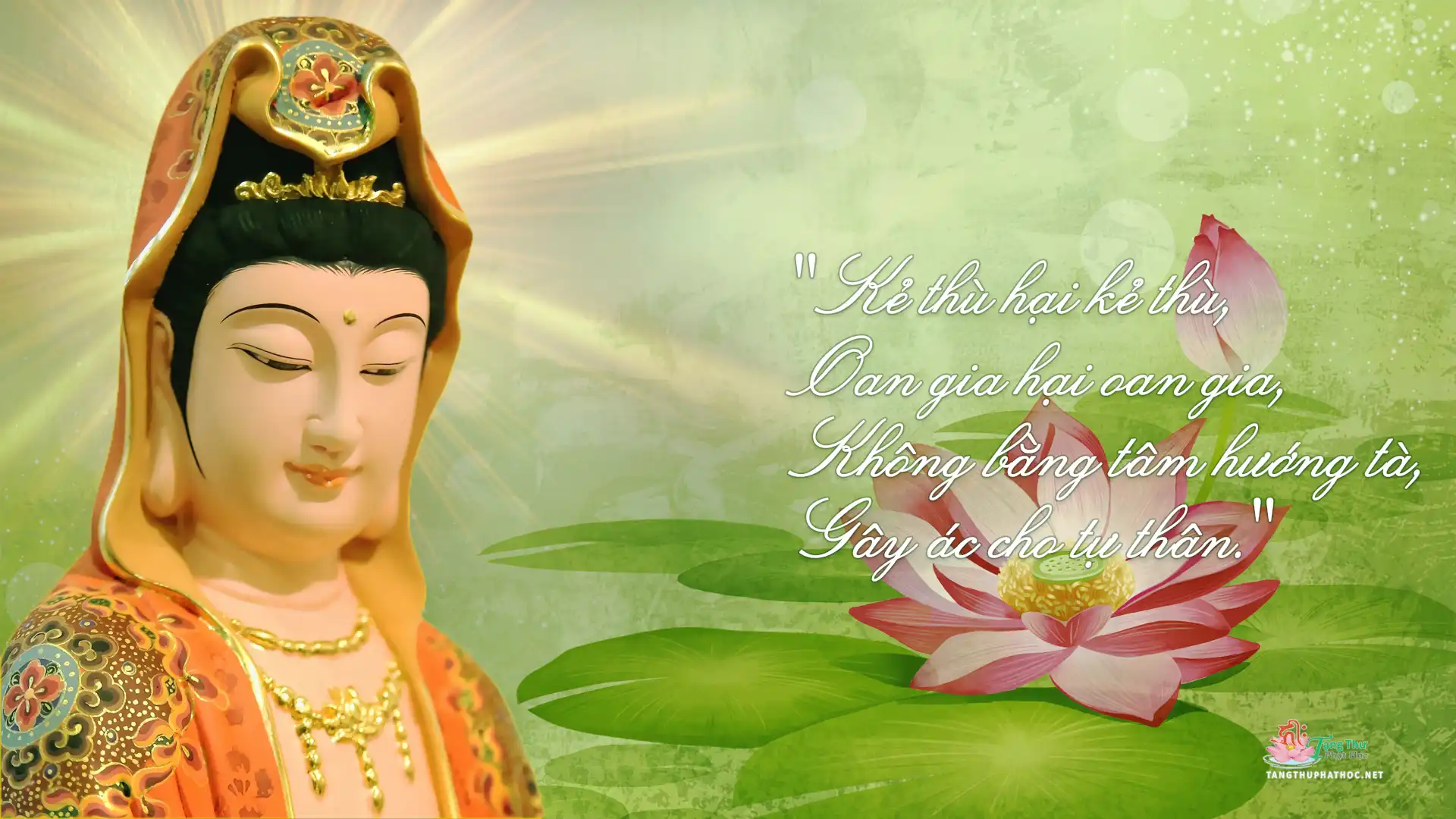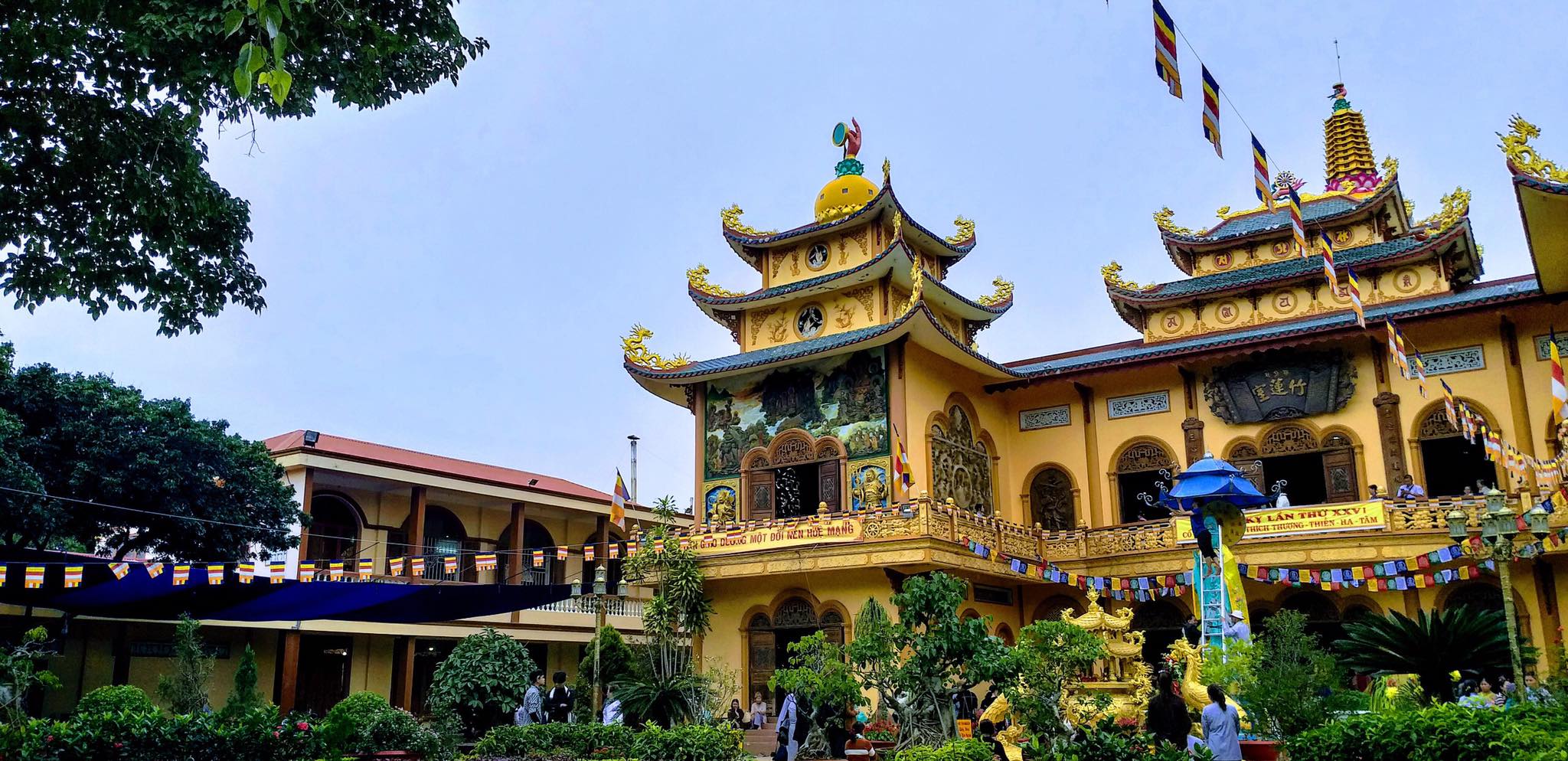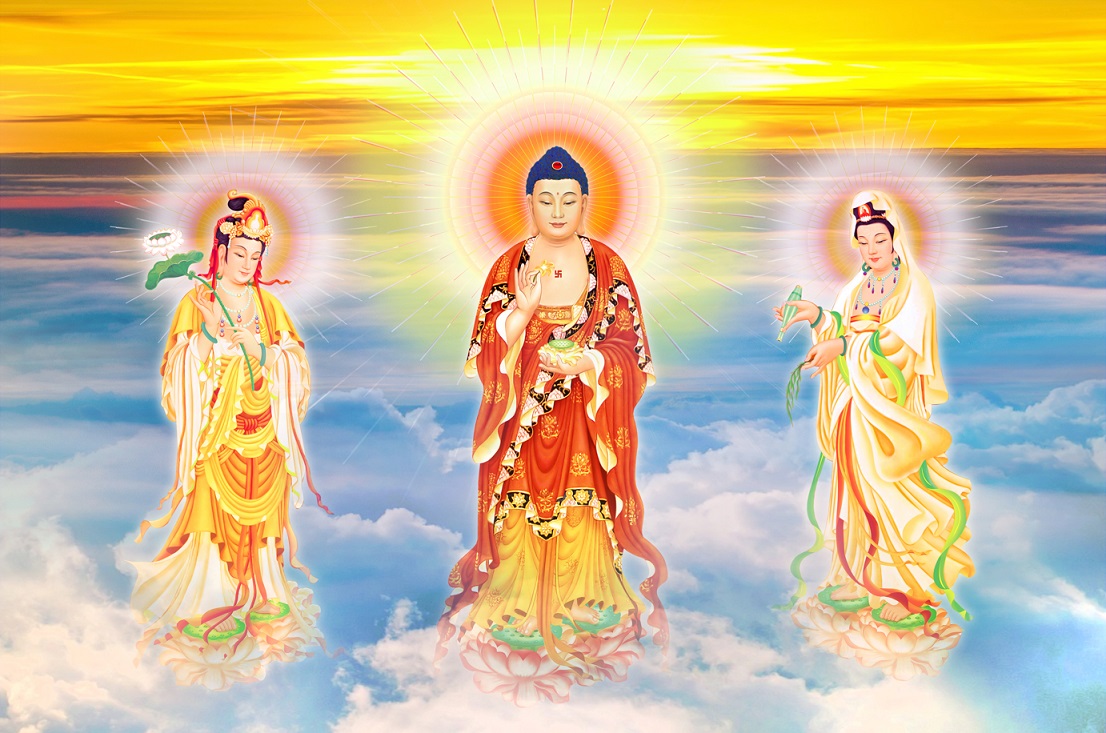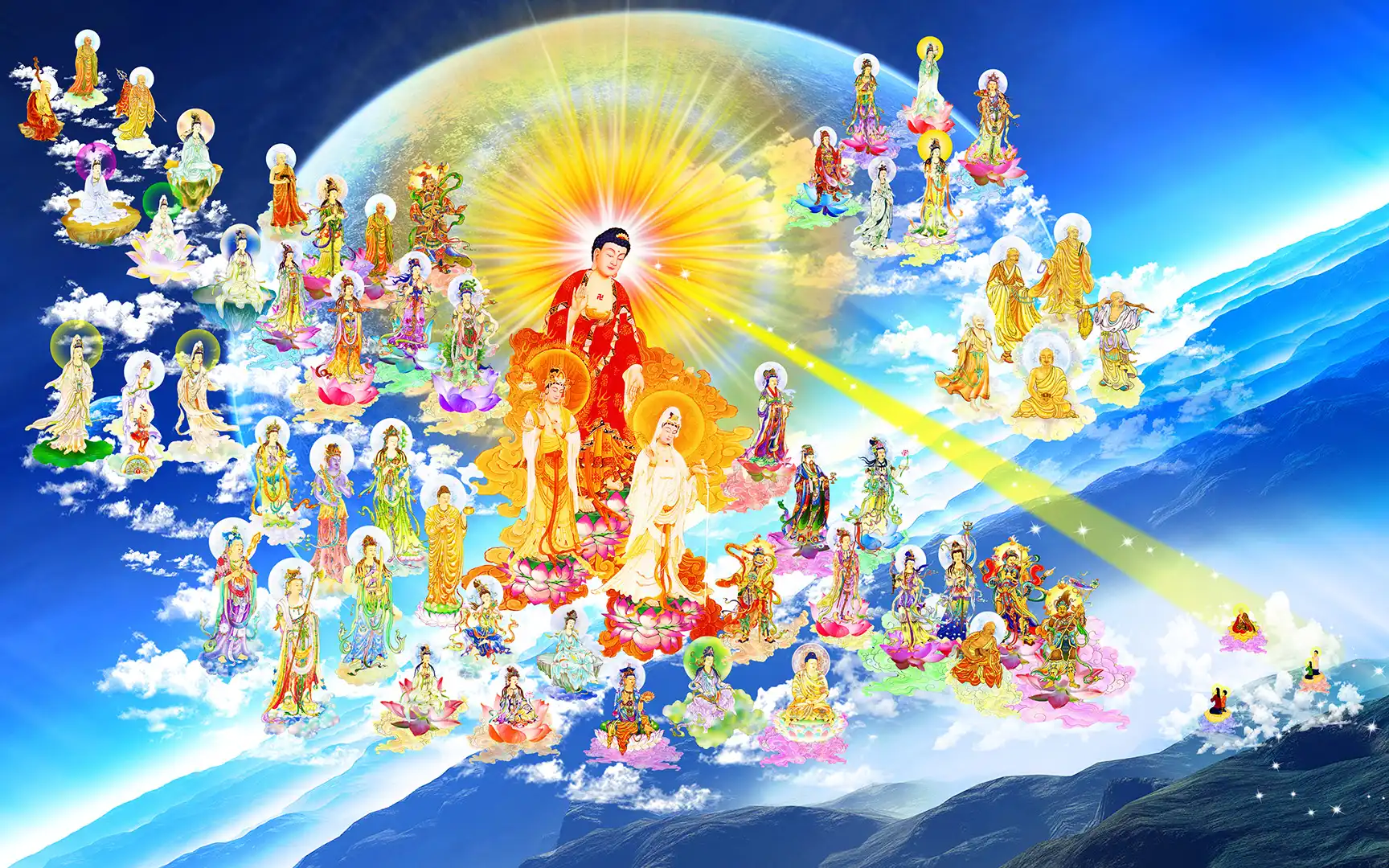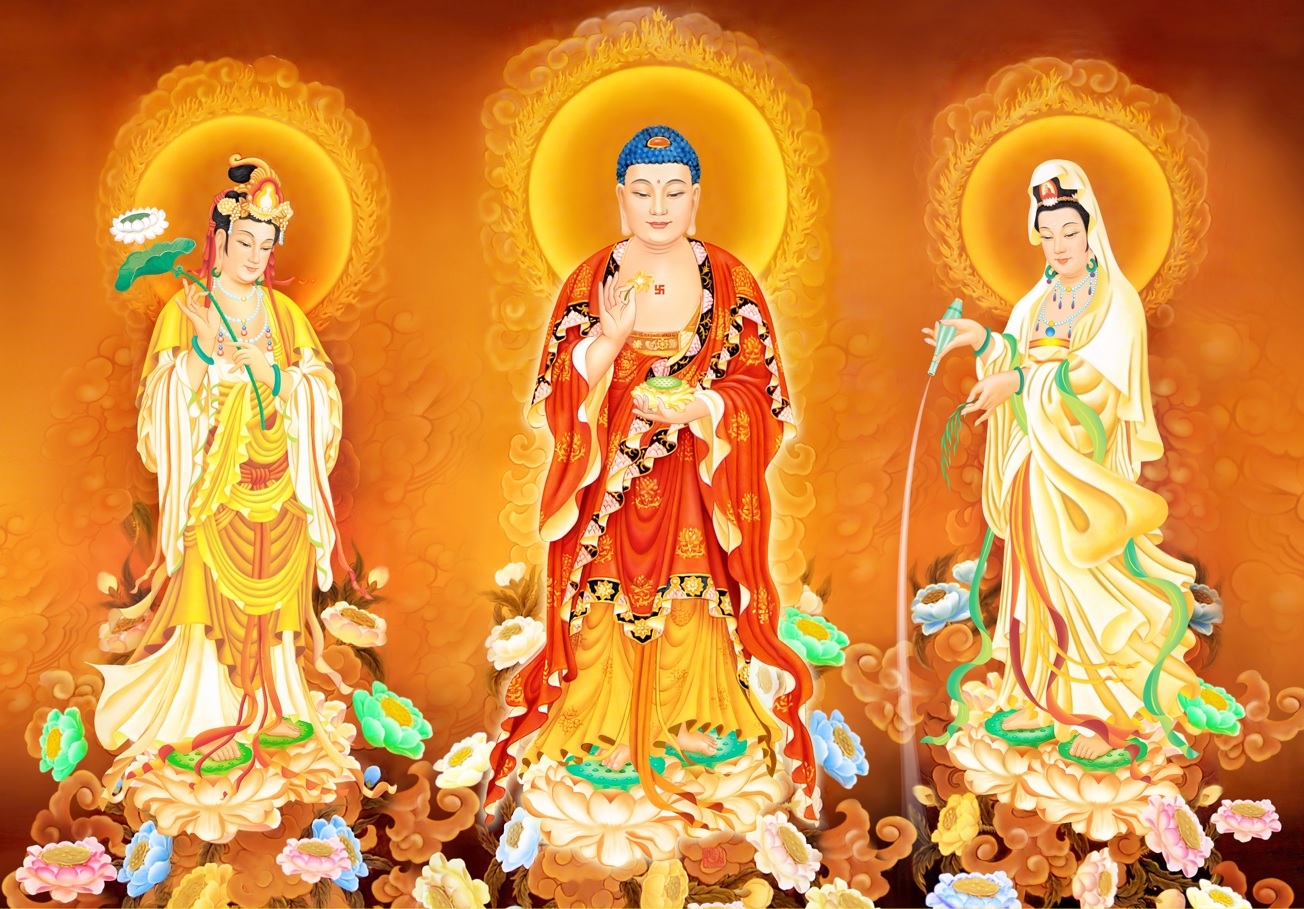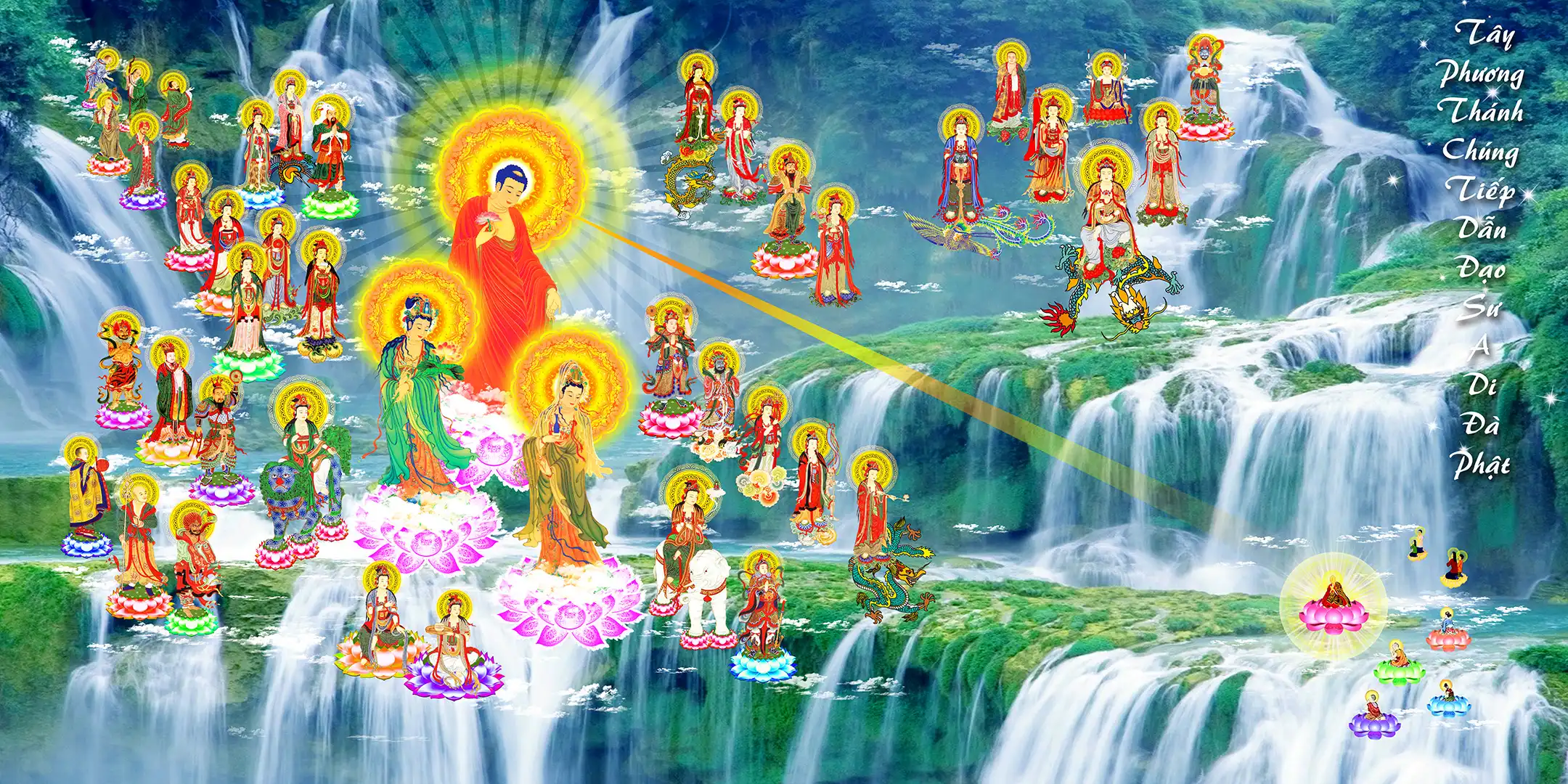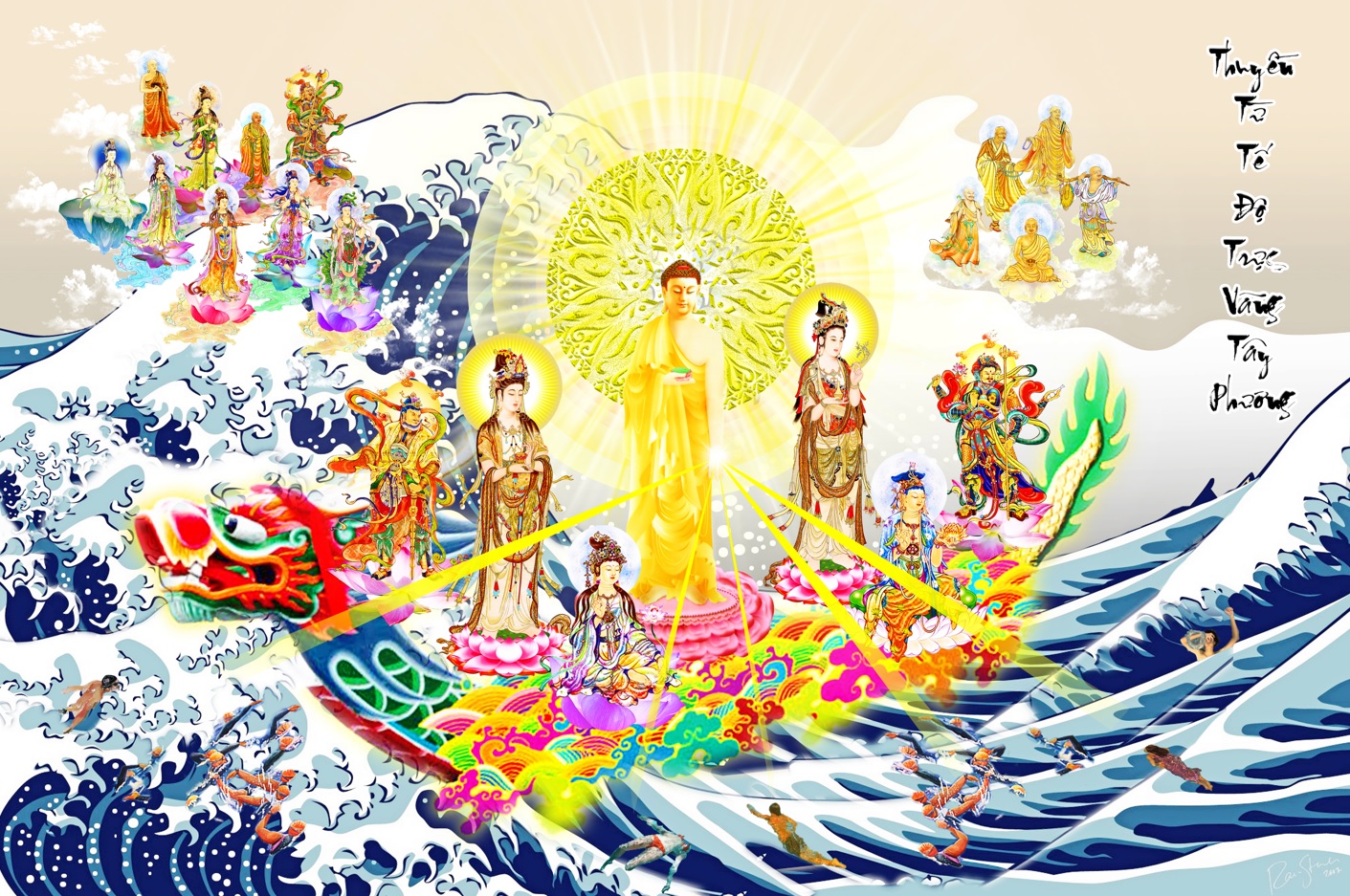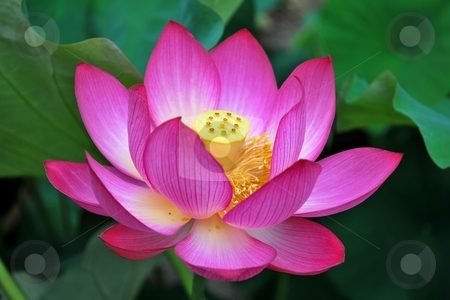COMMON BUDDHIST TEXT:
GUIDANCE AND INSIGHT FROM THE BUDDHA
Chief Editor: Venerable Brahmapundit
Editor: Peter Harvey
Translators: Tamás Agócs, Peter Harvey, Dharmacārī Śraddhāpa, P.D.Premasiri, G.ASomaratne, Venerable Thich Tue Sy
PART I: THE BUDDHA
CHAPTER 1: THE LIFE OF THE HISTORICAL BUDDHA
Conception, birth and early life
L.1 The wondrous birth of a great being
Here the Buddha addresses Ānanda, the disciple who acted as his chief personal attendant. The Buddha has previously told him of various wondrous things pertaining to his conception and birth, and now asks him to enunciate them so that other monks can hear of and be inspired by them.
Then the Blessed One addressed Venerable Ānanda: ‘Ānanda, that being so, you may eulogize more fully the wonderful and marvellous qualities of the Tathāgata.’
‘Venerable sir, I heard and learned this from the Blessed One’s own lips:
“Ānanda, mindful and clearly comprehending1 the bodhisatta appeared in the Tusita heaven.2” Venerable sir, this I consider as a wonderful and marvellous quality of the Blessed One.
… “Ānanda, mindful and clearly comprehending the bodhisatta remained in the Tusita heaven.” Venerable sir, this too I consider as a wonderful and marvellous quality of the Blessed One. … “Ānanda, for the whole of his lifespan the bodhisatta remained in the Tusita heaven.” Venerable sir, this too I consider as a wonderful and marvellous quality of the Blessed One.
… “Ānanda, mindful and clearly comprehending the bodhisatta departed from the Tusita heaven and descended into his mother’s womb.” Venerable sir, this too I consider as a wonderful and marvellous quality of the Blessed One.
… “Ānanda, when the bodhisatta passed away from the Tusita heaven and descended into his mother’s womb, an immeasurable glorious light surpassing the divine majesty of the gods appeared in the world with its gods, māras and brahmās,3 with its people, renunciants, brahmins, kings and the masses. And even in those awful open world intervals, of gloom and utter darkness, where the sun and the moon, mighty and powerful as they are, cannot make their light prevail; there too an immeasurable glorious light surpassing the divine majesty of the gods appeared. And the beings reborn there perceived each other by that light: ‘Friend, so indeed there are also other beings reborn here.’ And this ten-thousand-fold world-system shook,4 quaked, and trembled, and an immeasurable glorious light surpassing the divine majesty of the gods appeared in the world.” Venerable sir, this too I consider as a wonderful and marvellous quality of the Blessed One.
… “Ānanda, when the bodhisatta descended into his mother’s womb, four young gods came to guard him at the four quarters so that no humans or nonhumans or anyone at all could harm the bodhisatta or his mother.” Venerable sir, this too I consider as a wonderful and marvellous quality of the Blessed One.
… “Ānanda, when the bodhisatta descended into his mother’s womb, the mother of the bodhisatta was inherently virtuous, refraining from killing living beings, refraining from taking what is not given, refraining from sexual misconduct, refraining from false speech, and refraining from wines, liquors, and intoxicants, the basis of negligence.”5 Venerable sir, this too I consider as a wonderful and marvellous quality of the Blessed One. …
… “Ānanda, on the seventh day after the birth of the bodhisatta, the bodhisatta’s mother passed away, and was reborn in the Tusita heaven.” Venerable sir, this too I consider as a wonderful and marvellous quality of the Blessed One.
… “Ānanda, other young women give birth after carrying the child in the womb for nine or ten (lunar) months, but not so the bodhisatta’s mother. The bodhisatta’s mother gave birth to him after carrying him in her womb for exactly ten months.” Venerable sir, this too I consider as a wonderful and marvellous quality of the Blessed One.
… “Ānanda, other young women give birth seated or lying down, but not so the bodhisatta’s mother. The bodhisatta’s mother gave birth to him standing up.” Venerable sir, this too I consider as a wonderful and marvellous quality of the Blessed One.
… “Ānanda, when the bodhisatta came forth from his mother’s womb, gods received him first, then human beings.” Venerable sir, this too I consider as a wonderful and marvellous quality of the Blessed One.
… “Ānanda, when the bodhisatta came forth from his mother’s womb, he did not touch the earth. The four young gods received him and set him before his mother saying: ‘O queen, rejoice, a son of great power has been born to you’.” Venerable sir, this too I consider as a wonderful and marvellous quality of the Blessed One.
… “Ānanda, when the bodhisatta came forth from his mother’s womb, he did so dirt free, unsmeared by water, humours, blood, or any kind of impurity, clean and dirt free. Ānanda, suppose there were a gem-jewel placed on a Kāsi cloth, then the gem would not smear the cloth or the cloth the gem. Why is that? It is because of the purity of both. Ānanda, so too when the bodhisatta came forth from his mother’s womb, he did so dirt free, unsmeared by water, humours, blood, or any kind of impurity, clean and dirt free.” Venerable sir, this too I consider as a wonderful and marvellous quality of the Blessed One.
… “Ānanda, when the bodhisatta came forth from his mother’s womb, two jets of water appeared to pour from the sky, one cool and one warm, for bathing the bodhisatta and his mother.” Venerable sir, this too I consider as a wonderful and marvellous quality of the Blessed One.
… “Ānanda, as soon as the bodhisatta was born, he stood firmly with his feet on the ground; then he took seven steps facing north, and with a white parasol held over him, he looked at every quarter and uttered the words establishing his leadership:6
I am the highest in the world;
I am the best in the world;
I am the foremost in the world.
This is my last birth; now no more renewed existence.”
Venerable sir, this too I consider as a wonderful and marvellous quality of the Blessed One.
… “When the bodhisatta came forth from his mother’s womb, an immeasurable glorious light surpassing the divine majesty of the gods appeared in the world with its gods, māras and brahmās, with its people, renunciants, brahmins, kings and the masses. And even in those awful open world intervals, of gloom, and utter darkness, where the sun and the moon, mighty and powerful as they are, cannot make their light prevail; there too an immeasurable glorious light surpassing the divine majesty of the gods appeared. And the beings reborn there perceived each other by that light: ‘Friend, so indeed there are also other beings reborn here.’ And this ten-thousand-fold world-system shook, quaked, and trembled, and an immeasurable glorious light surpassing the divine majesty of the gods appeared in the world.” Venerable sir, this too I consider as a wonderful and marvellous quality of the Blessed One.’
‘Ānanda, that being so, you should consider this too as a wonderful and marvellous quality of the Tathāgata: Ānanda, here for the Tathāgata feelings are known as they arise, as they are present, as they disappear; perceptions are known as they arise, as they are present, as they disappear; thoughts are known as they arise, as they are present, as they disappear; Ānanda, you should consider this too as a wonderful and marvellous quality of the Tathāgata.’
‘Venerable sir, since this is so, I consider this too as a wonderful and marvellous quality of the Blessed One.’
Acchariya-abbhuta Sutta: Majjhima-nikāya III.118–120, 122–124, trans. G.A.S.
L.2 Prediction of his future greatness
This passage tells of how the gods informed a sage of the birth of the bodhisatta, and how he eagerly went to see him, and predicted his future attainment of awakening.
The seer Asita saw King Sakka9 who were joyful and happy and in their clean garments, praising exceedingly, having held up a cloth.
Seeing the gods were pleased in mind and cheerful, having paid his respects, he said this there: ‘Why is the community of gods extremely happy? What do they celebrate holding up a cloth?’
Even when there was a battle with the demi-gods, the victory went to the gods (and) the demi-gods were defeated. Even then there was no such excitement. Having seen what marvel are the Maruts (the gods) elated?
The gods shout, sing, and play music; they slap their arms, and dance. I ask you the inhabitants of the Meru’s crest:10 Sirs, please dispel my doubt quickly.’
‘The bodhisatta, excellent jewel, incomparable, has been born in the village of the Sakyans, in the Lumbinī country, in the human world for our benefit and happiness. So we are jubilant, exceedingly pleased.
He is the best of all beings, the topmost person, the human bull, the greatest among all people. Roaring like a mighty lion, the overlord of animals, he will cause the wheel (of Dhamma) to turn in the grove named after the seers.’11
Having heard the utterance, he descended hastily and arrived at the dwelling of Suddhodana.12 Having sat down there the seer said to the Sakyans: ‘Where is the young boy? I too wish to see him.’
The Sakyans then showed the child, the young boy, who was resplendent with glory, perfect in complexion, like burning gold burnished by an incredibly skilful smith in the very mouth of the furnace, to the one called Asita.
Seeing the young boy blazing like fire, purified like the lord of stars going in the sky, like the glittering sun released from clouds in autumn, he, being joyful, experienced abundant rapture.
The Maruts held in the sky an umbrella with many ribs and a thousand circles. Yak-tail fans with golden handles fluttered up and down; but the holders of the umbrella and the fans were not seen.
The seer called Kaṇhasiri (Asita), the one with matted locks, having seen (the young boy) like a golden ornament on a pale red blanket, and the white umbrella being held above his head, with gladdened mind, cheerful, received him.
Having received the Sakyan bull, examining him, he, an expert in marks and mantras, raised his voice with confidence: ‘This one, incomparable, is supreme among the two legged (humans).’
Then, reflecting on his own departure, being dejected, he shed tears. Seeing the seer wailing, the Sakyans said: ‘Surely, there will not be any danger to the young boy’?
Seeing the Sakyans unhappy, the seer said: ‘I do not see any harm destined for the young boy. Nor will there be any danger for him. This is not an inferior being. Be pleased.
This boy will reach the peak of awakening. Seeing what is supremely purified, having sympathy for the benefit of the great majority, he will turn the wheel of the Dhamma.13 His holy life14 will be widely known.
Little of my life here remains; then there will be death for me. I shall not hear the Dhamma of the peerless one; so I am afflicted, overwhelmed by disaster, miserable.
Nālaka Sutta: Sutta-nipāta 679–694, trans. G.A.S.
L.3 Parents
Here an awakened monk names the Buddha’s parents, with the Buddha’s father as in a certain sense the monk’s ‘grandfather’.
A hero of great wisdom indeed cleanses seven generations in whatever family he is born. I think, Sakiya (Suddhodana), you are the king of gods, for you begot the sage who is truly named.
The father of the great seer is called Suddhodana. The mother of the awakened one was called Māyā, who, having cherished the bodhisatta with her womb, after the breaking up of the body rejoices in the three heavens.
She, Gotamī 15 (Māyā), having died, having descended from here, being possessed of divine sensual pleasures, rejoices in the five strands of sensual pleasures, surrounded by the groups of gods.
I am the son (the disciple) of the Buddha, who endures what is beyond endurance, the son of the incomparable Venerable Aṅgīrasa.16 You, Sakiya (Suddhodana), are my father’s father; truly you are my grandfather, Gotama.
Kāḷudāyī’s verses: Theragāthā 533–536, trans. G.A.S.
L.4 Gotama’s family
This passage refers to the Buddha’s son, who later ordained as a monk under him and attained arahantship. The Buddha’s father remained a layperson and attained stream-entry, the first level of spiritual nobility; his stepmother (Mahā-pajāpatī) became the first nun, and an arahant; his wife also seems to have also become a nun, and an arahant.
They know me as ‘lucky’ Rāhula – lucky for two reasons: one that I am the son of the awakened one, and the other that I am one with vision of truths.
Rāhula’s verses: Theragāthā 295, trans. G.A.S.
L.5 Lavish young life
This passage describes an early life of great comfort, but then moves to reflections on ageing, sickness and death as coming to us all.
Monks, I lived in refinement, utmost refinement, and total refinement. In my father’s home, there were lotus ponds just made for me: one where red-lotuses bloomed, one where white lotuses bloomed, one where blue lotuses bloomed, all for my sake. I used no sandalwood that was not from Kāsi.17 My turban was from Kāsi, as were my tunic, my lower garment, and my outer cloak. A white umbrella was held over me day and night to protect me from cold, heat, dust, dirt, and dew.
Monks, I had three mansions: one for the cold season, one for the hot season, and one for the rainy season. During the four months of the rainy season, being entertained in the mansion for the rainy-season, by musicians without one man among them, I did not once come down from the mansion. Whereas the servants, workers, and retainers in others’ homes are fed meals of broken rice with lentil soup, in my father’s home the servants, workers, and retainers were fed wheat, rice, and meat.
Monks, endowed with such affluence, living in such refinement, I considered: ‘When an untaught ordinary person, himself subject to ageing, not beyond ageing, sees another who is aged, he is horrified, humiliated, and disgusted, oblivious to himself that he too is subject to ageing, not beyond ageing. If I who am subject to ageing, not beyond ageing, were to be horrified, humiliated, and disgusted on seeing another person who is aged, that would not be fitting for me.’ As I pondered thus, the young person’s intoxication with youth entirely dropped away.
… [The same is then said replacing ‘aging’ with ‘illness’ and then ‘death’, such that] the healthy person’s intoxication with health entirely dropped away. … the living person’s intoxication with life entirely dropped away.
Sukhumāla Sutta: Aṅguttara-nikāya I.145, trans. G.A.S.
L.6 Pleasures of the senses
In this passage, the Buddha reflects on the pleasures of his youth, and then on the limitations and dangers of such pleasures.
‘Māgandiya,18 formerly when I lived the home life, I enjoyed myself, provided and endowed with the five strands of sensual pleasure:19 forms discernible by the eye that are wished for, desired, agreeable, likeable, connected with sensual desire and provocative of lust; sounds discernible by the ear; odours discernible by the nose; flavours discernible by the tongue; tangibles discernible by the body, that are wished for, desired, agreeable, likeable, connected with sensual desire and provocative of lust.
… On a later occasion, having understood as they really are the origin, the disappearance, the gratification, the danger of sensual pleasures, and the escape from them, I abandoned craving for sensual pleasures; I removed fever for sensual pleasures; I abide without thirst, with a mind inwardly at peace.
I see other beings who are not free from lust for sensual pleasures, being devoured by craving for sensual pleasures, burning with fever for sensual pleasures, indulging in sensual pleasures. I do not envy them, nor do I delight therein. Why is that? Māgandiya, there is a (meditative) delight apart from sensual pleasures, apart from unwholesome states, which surpasses even divine pleasure. Since I take delight in that, I do not envy what is inferior, nor do I delight therein. …
Māgandiya, suppose there was a leper with sores and blisters on his limbs, being devoured by worms, scratching the scabs off the openings of his wounds with his nails, cauterizing his body over a burning charcoal pit. Then his friends and companions, his kinsmen and relatives, would bring a physician to treat him. The physician would make medicine for him, and by means of that medicine the man would be cured of his leprosy and would become well and happy, independent, master of himself, able to go where he likes. Then he might see another leper with sores and blisters on his limbs, being devoured by worms, scratching the scabs off the openings of his wounds with his nails, cauterizing his body over a burning charcoal pit.
Māgandiya, what do you think? Would the man envy that leper for his cauterizing the body over a burning charcoal pit, or for his use of medicine?’ ‘No, venerable Gotama. Why is that? Venerable Gotama, because when there is sickness, there is need for medicine; when there is no sickness, there is no need for medicine.’ ‘Māgandiya, similarly when I lived the home life before, I enjoyed myself provided and endowed with the five strands of sensual pleasure. … On a later occasion, having understood as they really are the origin, the disappearance, the gratification, the danger of sensual pleasures, and the escape from them, I abandoned craving for sensual pleasures, I removed fever for sensual pleasures, and now I abide without thirst, with a mind inwardly at peace.
Now I see other beings who are not free from lust for sensual pleasures, being devoured by craving for sensual pleasures, burning with fever for sensual pleasures, indulging in sensual pleasures, but I do not envy them, nor do I delight therein. Why is that? Māgandiya, there is a delight apart from sensual pleasures, apart from unwholesome states, which surpasses even divine pleasure. Since I take delight in that, I do not envy what is inferior, nor do I delight therein.


